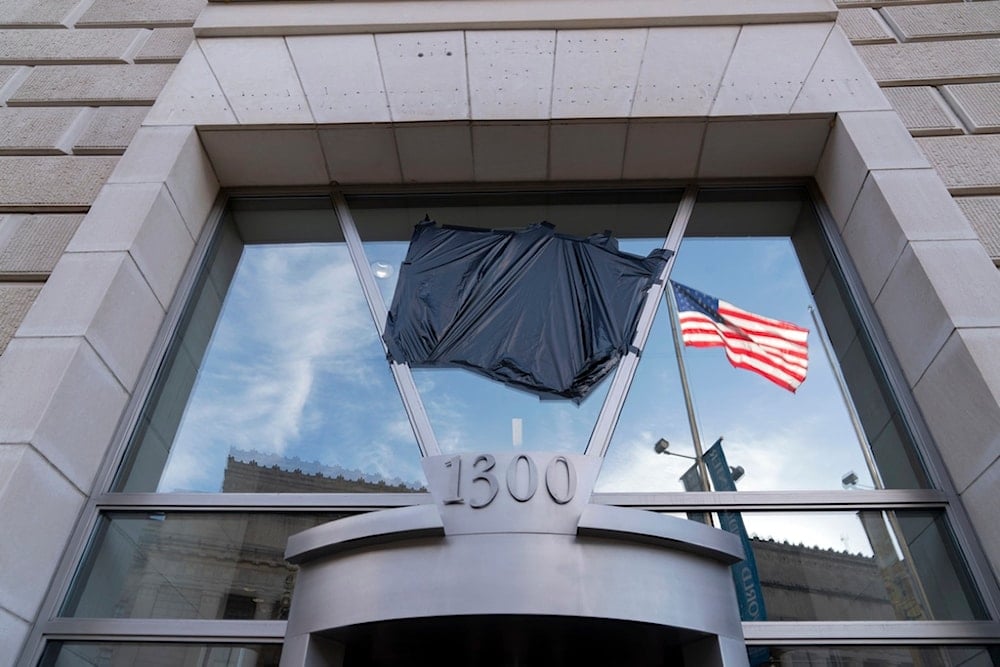US-funded Cuban media in peril as USAID faces dismantling
A lawsuit has been filed in Washington, DC, by the American Federation of Government Employees (AFGE) and the American Foreign Service Association (AFSA), alleging that the shutting down of USAID violates constitutional and humanitarian principles.
-

The American flag flying alone beside an empty flagpole that previously had the flag of the US Agency for International Development, or USAID, are pictured in the reflection of a window that previously had the sign and the seal of USAID, outside the agency's headquarters in Washington, Friday, Feb. 7, 2025 (AP Photo/Jose Luis Magana)
Reuters on Tuesday reported that media outlets covering Cuba and previously funded by the US Agency for International Development (USAID) are now scrambling for alternative financial support as the Trump administration moves to dismantle USAID. The shift has left these outlets uncertain about their future, with many now appealing directly to readers for contributions.
A State Department directive has effectively halted most foreign aid programs, including financial support for Cuban-focused media organizations that operate outside Havana's control. The decision, now under judicial review, is in line with Trump's "America First" policy, which seeks to redirect US foreign aid toward domestic priorities.
The financial impact has been immediate. In 2024, USAID allocated $2.3 million for media programs on Cuba, most of it under the initiative "Independent Media and Free Flow of Information". Without these funds, outlets that relied on US government support are now at risk of shutting down.
Among those affected is Miami-based CubaNet, which had received $500,000 from USAID in 2024 to produce "objective and uncensored multimedia journalism" targeting young Cubans.
Last week, the outlet published an editorial urging readers for donations, stating: "We are facing an unexpected challenge: the suspension of key funding that sustained part of our work. If you value our work and believe in keeping the truth alive, we ask for your support."
Similarly, Madrid-based Diario de Cuba has also reached out to its audience. Its director, Pablo Díaz Espí, wrote: "Aid to independent journalism from the US government is suspended, which makes our work even more arduous."
📢 Desde hace 15 años te contamos lo que el #RégimenCubano no quiere que sepas. Si resides fuera de #Cuba, hoy te pedimos que NOS APOYES con una #donación. 🇨🇺 Si nos lees desde la Isla, ¡comparte!
— DIARIO DE CUBA (@diariodecuba) February 7, 2025
¡Gracias por leernos!
👉 APÓYANOS en https://t.co/wDYgB4R7QO
🔗VISITA… pic.twitter.com/Are8iLLOoq
Major Shifts
For decades, the US government has funded Cuban opposition groups and media organizations under the pretext of promoting press freedom and human rights. However, the latest move signals a potential shift in policy.
Critics argue that this decision contradicts long-standing US efforts to undermine Cuba's government by supporting independent journalists. Some press freedom groups have raised concerns, warning that the aid freeze could lead to the collapse of these news outlets. Reporters Without Borders (RSF) noted that USAID has been instrumental in training thousands of journalists and supporting hundreds of independent media outlets worldwide.
Cuban Government Responds
The Cuban government has long criticized US-funded media, arguing that these organizations serve as proxies for US foreign policy rather than truly independent journalism. Foreign Vice Minister Carlos Fernández de Cossio openly criticized the journalists who depended on US funds, stating:
"Is there anything independent about a journalist, an activist, or an opposition member who lives off the money paid by the US government through USAID and now feels suffocated when they shut off the tap?"
Havana has banned US-funded media from operating on the island, forcing many journalists to halt their work.
Legal Challenges
The decision to dismantle USAID has sparked legal backlash. A lawsuit has been filed in Washington, DC, by the American Federation of Government Employees (AFGE) and the American Foreign Service Association (AFSA), alleging that the move violates constitutional and humanitarian principles. President Trump, Secretary of State Marco Rubio, and Treasury Secretary Scott Bessent have all been named as defendants in the case.
Meanwhile, newly appointed Secretary of State Marco Rubio, a staunch opponent of the Cuban government, has vowed to intensify sanctions on Havana. However, he has not commented on the USAID funding freeze for Cuban media outlets.
Read more: Trump renews economic war on Cuba in first batch of orders

 4 Min Read
4 Min Read








